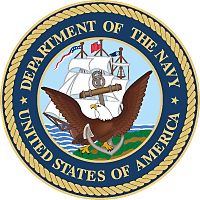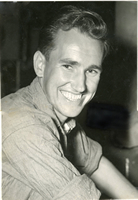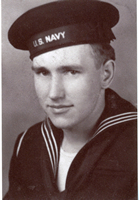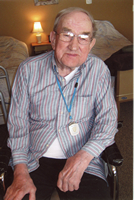
- Name: William "Bill" Toivo Korhonen
- Location of Birth: Swan River, Minnesota (at farm home)
- Date of Birth: December 6, 1922
- Date of Death: March 31, 2013 (90 years old)
- Parents: Toivo and Lydia Korhonen
- High School and Class: Grand Rapids High School, Grand Rapids, Minnesota - 10th grade
- College:
- Highest Rank: MOMM 1 (Motor Machinist's Mate First Class)
- Branch: Navy
- Other Branch:
- Date Sworn In: November 26, 1942
- Place Sworn In: Duluth, Minnesota
- Date of Discharge: November 13, 1945
- Place of Discharge: Personnel Service Center, Memphis, Tennessee
-
Units and Locations:
Start Date End Date Unit(s) and Location(s) Served November, 1942 Basic training in Farragut, Idaho February, 1943 Land Craft School in San Diego, California and Fleet Service School in San Diego, California - completion of additional mechanic training May, 1943 Transferred to Diesel Mechanic School at University of Missouri in Columbia, Missouri July, 1943 Shipped to Naval Advanced Base, Torokina, assigned to USS Libra at Bougainville (served as Barge Mechanic) November, 1945 Transferred to Mobjack until war ended - Military Awards:
- Military Highlights:
Information from Bill's daughter, Diane Korhonen Gross:
My father, William Korhonen, did not speak of his military life very often. He was involved in one conflict with a Japanese fighter plane. The barges (5) were waiting for a United States fighter plane to cover their drop-off of Marines onto Bougainville soil. Four were tied together and my father's barge was alone in another direction. The United States plane did not appear. A solo Japanese plane headed toward the four barges. Luckily, my father's barge was also armed with 50-caliber machine guns. My dad (age 19) began shooting as his partner (age 17) froze. The Japanese pilot was intent on attacking the group of barges and missed seeing the solo 5th barge. The plane was hit at close range, began to smoke, and then went down a quarter mile beyond the barges. My father said he was so thankful to have a gun to shoot! That incident was his only exchange of fire in the service.
Bill volunteered for service in the United States Navy during World War II and was assigned to diesel mechanic school in Columbia, Missouri. He shipped out of San Francisco, California for service in the South Pacific where he operated the engines on PT boat tenders and manned the machine gun on landing barges. While working in the engine rooms, he would hear torpedoes whistle by the ship's hull. Bill participated in the Solomon Islands campaign and served until the war ended.
An oral history was completed by Jim Wycor in 2007 on Bill Korhonen. This is additional information from the oral history. A copy of this transcript is in the Karjela Research Center at the Itasca County Historical Society in a manuscript file.
Bill was on a barge landing craft that were called LCM's (Landing Craft Mechanized). When an assault landing was made, they always had 20 Marines on the landing craft. He dropped troops many times--it must have been at least ten times. Bill's job was to keep the engines running, man a 50-caliber machine gun, and drop the ramps so that troops could run off. Bill reported that it was just a natural instinct to drop the ramps as soon as the barge came to a stop. The landing craft, the USS Libra, had four barges hanging on the booms on the side and there were twelve barges on the top of the hatches. The barges were dropped in the water and then the Marines climbed down a rope ladder. When going in for a landing, there is supposed to be United States air fighter planes covering the landing. Around 4:00 a.m. on the day of the invasion, Bill's barge was hanging on the boom over the side, so it was one of the first ones in the water. Only the barges that were hanging on the booms were dropped in the water and they heard the anchor going up on the ship. Bill questioned what the noise was and was told that's the anchor going up the ship. So he questioned if they were going to make the landing. Bill was told yes, but evidently the Jap Air Force was going to be there early and the United States Air Force was late. The big ships were going out to sea and they're leaving the barges right there. So, while they were sitting there, some of the boats cruised out to other ships. They were green horns from the States and didn't know what was going to happen. These boats tied up together to "bs". Bill's group went about 200 feet away from them so if a plane comes after those three barges, Bill's guys were supposed to give it to them. Bill was on the port side of the barge and there was another sailor, named A. B. Harris, on the starboard. Each had 50-caliber machine guns. They were told to get their guns ready since a plane looked like it was going straight for the barges. The plane came down and it was so close, Bill said he should have fired at it sooner, but it looked like a young kid flying it and he could see his face and he was just laughing. Bill fired at him, about 15-20 rounds and his lids (tracers) every fifth so the tracers were going into the plane. They could see them hitting the plane and that pilot, all of a sudden, turned his head and looked right at Bill. He was surprised that he got hit. That pilot turned to fly away and he went about a quarter of mile because the plane started to smoke and burn. Down he went. DKL, twirled his mustache and said, "Bill, you got that one". And then he was mad at A. B. Harris because A.B. hadn't fired a shot. DKL told A. B., "if you're going to stay on this barge you got to shoot". A. B. didn't say much at first, but 2 hours later they made an invasion. A.B. fired then. Bill was transferred to the USS MobJack. Bill and Sam King, rode the Borneo and went aboard the MobJack. The Captain called them into his office and told them that he was going to give them 30 days to get acquainted and the guy they were relieving would teach them where the parts are on the ship, spare parts and get them acquainted with the crew. Sam King was assigned to the forward main engine and Bill was on little, small engines on the landing craft. He was in total charge of all the 4 generator diesels on that ship. Two in the forward engine room and two in the aft engine room. Bill was on the MobJack about 4 or 5 months, when the war ended.
- Wars Involved:
World War II - MIA / POW:
- Civilian Life:
Bill grew up in Swan River, Minnesota and attended the Maki School, a one-room school in Swan River, and Grand Rapids High School, Grand Rapids, Minnesota.
Bill met Ethel Marybelle (Mary) Tennyson at a roller skating rink in Columbia, Missouri during his naval training. After Bill left for the South Pacific, they wrote to each other and eventually got engaged by mail. They were married while Bill was on leave, and after the war lived in Minneapolis, Minnesota and Duluth, Minnesota where Bill worked for Greyhound as a diesel mechanic. Bill and Mary eventually moved to the family farm in Swan River, Minnesota. Bill farmed, logged and worked as a diesel mechanic at the M.A. Hanna Company.
Bill delighted people with stories of his childhood in Swan River, hopping freight trains through Canada as a young man, World War II battles and serving in the South Pacific with Marty Robbins, the country western singer. In later life, his family would find a doctor or a nurse sitting on the edge of his bed, thrilled by one of his stories. Bill loved life on the farm. He was up early in the morning to get the weather report and take care of the cattle, and worked on farm projects well into the evenings. He liked to take people on tours of the farm and the neighborhood in an old truck, talking about the "old-timers" and local history. His family and friends loved him and will miss him.
Bill is survived by his children, Gloria Wahrenbrock, Kenneth (Jeannie) Korhonen, Donald Korhonen (Judy Connell), Diane (Gerald) Gross, Julie Pidhayny (Tim Buka), Cynthia (Robert) Holbrook, and Steven (Pamela) Korhonen; his siblings, Helen Jerome and Arthur (Clarice) Korhonen; eight grandchildren and eight great-grandchildren. He is predeceased by his wife, Mary, and his brother Elmer. - Tribal Affiliation(s):



